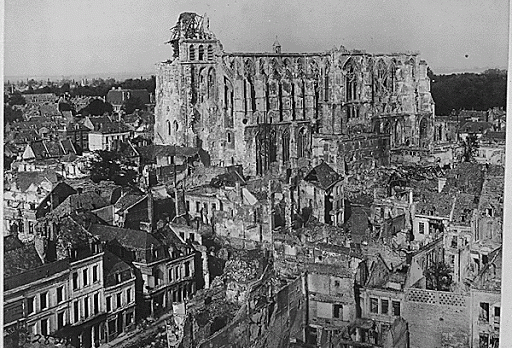Over the past few months, we have heard a great deal about the centennial of the First World War, so much in fact that we might be wearying of the topic. Do we really want to write our history entirely in wars and bloodshed? For Christians, though, and especially for Roman Catholics, it is impossible to exaggerate the influence of that struggle on modern-day realities. In large measure, the Great War made the modern Catholic Church.
It is well known that the theological reaction to the war transformed Protestant Christianity through the revolutionary theological work of thinkers like Karl Barth. But for Catholics, too, the Great War cast a very long shadow, and it subverted long-standing ideas of the proper relationship between the church and secular culture.
The horror of war forced believers to rediscover their own distinctive roots in terms of reasserting the value of spiritual authority, whether that meant the Bible, for Protestants, or the practices of the most ancient church, for Catholics and Orthodox. Across the spectrum, we see a far-reaching effort at what French thinkers termed ressourcement, the return to the sources of thought and belief.
Without their direct experience of war, we can scarcely understand the attitudes of some of the most significant Catholic thinkers of the century. This was especially true in France, which did not exempt clergy from conscription and active military service. Among France’s most influential thinkers of the era, Henri-Marie de Lubac was severely wounded at the bloody battle of Verdun, where lay philosopher Étienne Gilson also served. Mystical genius Pierre Teilhard de Chardin was a highly decorated frontline veteran, who described his war experience as a “meeting with the Absolute.” Jacques Maritain served briefly in the French forces before being invalided out. All had many friends who fought and perished in those years, or suffered from occupation. Although theologian Yves Congar was only ten when the war broke out, his diaries record the agonizing years in which German forces occupied his home, and which daily brought home to him the war’s effects on civilians.
In various ways, each of these—de Lubac, Gilson, de Chardin, Maritain, Congar—formed Catholic thought for decades to come. Together, they shaped what some termed nouvelle théologie, “new theology,” a term initially used in the scornful sense of a faddish innovation. Yet their theology was anything but new in its emphasis on ressourcement, a radical return to the world of the Bible and the early Fathers, and free of the trappings of political compromise.
These Catholic thinkers strove to limit the ambitions of the state and its claims upon the souls of individual believers. At the time, the best known of these thinkers was Maritain, whose theories were founded on liberal humanism, and a revived theory of natural rights. For Maritain, secular states could only demand the loyalty of Christians when they acknowledged the whole complex spiritual side of humanity. Among other achievements, he played a central role in drafting the Universal Declaration of Human Rights of 1948, and his concept of the “dignity of the human person” became integral to Catholic political thought. In one of his best-known books, Integral Humanism (1936), Maritain explored the prospects for a new Christendom, but one that would operate very differently from older models and be based on an acceptance of pluralism. This was a Christendom that decisively rejected militarism, tyranny, and even nationalism, in any traditional sense, and extolled social justice.
In the long term, the most important of the group was de Lubac. After the war, his extensive writings urged the church to ground itself in the ancient teachings of the church fathers, while becoming profoundly sensitive to the concerns of ordinary lay believers in a world constantly endangered by violence, terror and injustice. However glorious its supernatural claims, the Church was at the same time part of history, which meant that it could not be divorced from political and cultural realities. While never directly challenging the Church’s hierarchy, he retained his thorough distrust of unjust authority, and became a prominent resister in the Second World War.
De Lubac repeatedly faced censure for his daring views, but his ideas guided the Second Vatican Council of 1963–65, which transformed the Church. The Council was called by the epochal Pope John XXIII, yet another Great War veteran, who had served as a military chaplain and stretcher-bearer through the horrific Italian campaigns. Yves Congar also lived long enough to serve as a key thinker in the conciliar era.
Arguably, that revolutionary Council deserves to be regarded as the most momentous single event in the history of Christianity during the mid-twentieth century. The Council resoundingly declared that the Church was not just the hierarchy or the clergy but rather the whole people of God. It also emphasized biblical authority in a way that departed far from the Catholic practice of several centuries, and urged all the faithful to turn to their Bibles.
In 1991, the once-controversial de Lubac died vindicated, as a revered cardinal of the Church. He did not live to see the accession of Pope Francis I in 2013, a Jesuit like himself, and a man who echoed his own thought so closely. In his powerful warnings about the church’s over-close alliance with the world, about “spiritual worldliness,” Pope Francis has explicitly and repeatedly quoted de Lubac. The Verdun generation still exercised its influence in a new century.
And here is an intriguing thought. If events can cast their shadow a century or more into the future, who are the thinkers alive today who are shaping the destinies of the church of 2114?

